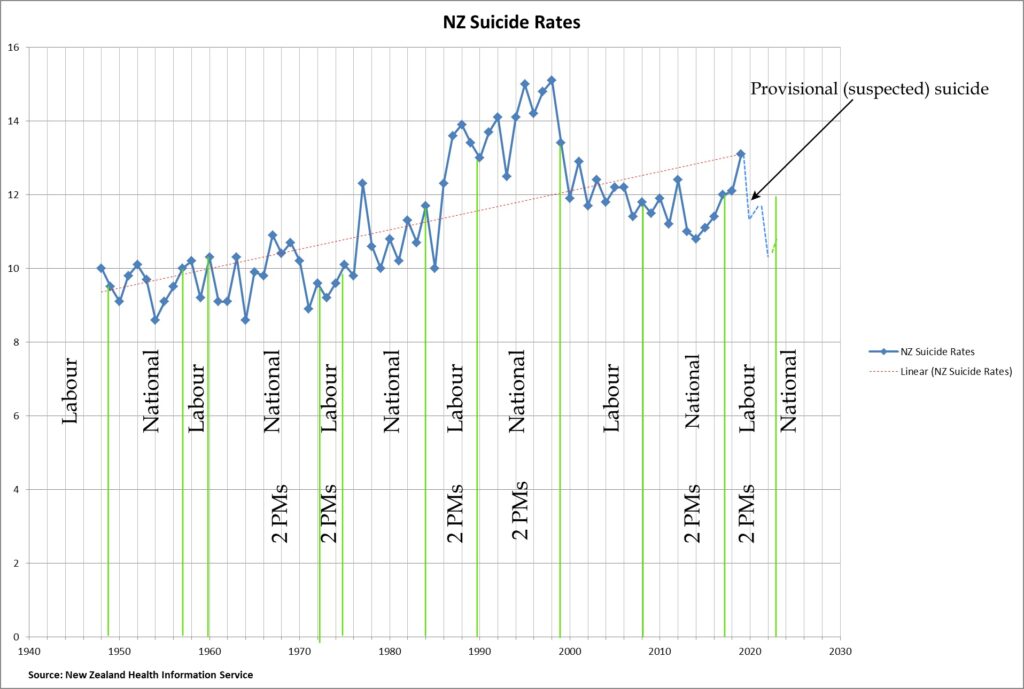“… above all we are going to be the change that New Zealanders voted for and the change that they were promised.” Rt. Hon. Christopher Luxon, New Zealand PM (18/2/2024).
Dear Mr Luxon, please remember that ‘more of the same’ does not constitute change in preventing youth suicide.
Citation: Shahtahmasebi, S. (2024) Editorial: New PM, new strategy? Dynamics of Human Health (DHH), 11(1): https://www.journalofhealth.co.nz/?page_id=3007
Editorial: New PM, new strategy?
Said Shahtahmasebi, PhD
In the October 2023 general election in New Zealand the National Party was forced to join with two other minor parties (ACT & NZ First) to form the new government of New Zealand. The new three party coalition government claimed the victory as a public mandate for ‘change’. The problem, as always, is that ‘change’ is loosely defined.
I recently received the sad news from a friend that over the festive season Christmas 2023, a cheerful young adult whom my friend had known socially had committed suicide. Details of the suicide are withheld to avoid identification of the case but it was a shocking surprise to my friend. This is not the only case of suicide nor will it be the last one.
Available data suggests that in 2021-22, 557 people died by suicide. Forecasting suicide numbers/rates based on historical suicide data forecasts suicide to follow an increasing trend by 2028 (Shahtahmasebi & Gregory-Allen 2023).
In most cases suicide is preventable, but the ‘experts’ and politicians’ infatuation with mental illness as the cause of suicide has prevented progress in reducing suicide numbers, and has led to ‘more of the same’ policy actions but with increasing costs. For this infatuation to work we have to wait for a mental illness to manifest followed by a diagnosis and subsequent treatment. This is an intervention strategy rather than a prevention one.
There is ample evidence that current strategies to prevent suicide based on mental illness do not work (Shahtahmasebi 2013). This is despite governments around the world, (as is the case) in New Zealand, focussing additional funding and resources on mental health services for suicide prevention. Globally, for decades, the official and standard suicide prevention policy has been constant by holding mental illness responsible for suicide. Thus, a question that arises is whether type of government (left, centre, right, coalition) affects the suicide rate. In other words, suicide rates may be subject to macro-level government policies so that temporal dependencies in suicide rates may be due, at least in part, the type of government in power.
Figure 1, shows New Zealand’s historical suicide rates marked with the timing and duration of the government at the time1. It can be seen that regardless of the government in power suicide trends continue to follow a cyclic pattern, e.g. suicide rates go up as well as down during the term of every government be it Labour or National. Unfortunately, the overall suicide trend is upward and forecasted to continue so (Shahtahmasebi & Gregory-Allen 2023). There is an indication, based on provisional rates, that suicide rates did go down in the years 2020-22 but then increased in 20232.
So the issue is not whether politics (as indicated by the party is in power), it is to do with why each serving government’s policies do not protect the public against suicide. For example, socio-economic, health and environment policies developed by a National (right wing) government may favour the more ‘wealthy’ portion of the population while a Labour (left wing) government may favour the ‘working-man’. Thus, there will always be a group or groups that are excluded from the receiving end of the policies.
More importantly, we must begin to gain insight into how various governments’ policies interact, not only with each other but also, with governments’ suicide prevention policies. This is the subject of a new analysis currently being conducted in New Zealand.
Figure 1. Politics and suicide

A major mistake often made by practitioners and decision makers has been to compare suicide rates/numbers with the previous year or within a short period, thus missing out on the valuable information that the whole series can provide. As a result, decision makers appear to be content with the experts’ simplistic and limited explanation, i.e. when the suicide trend is downward then current policies are credited with a reduction in suicide rates, but when the suicide trend is upward they refuse to take responsibility and blame the rise on the complex multi-factor nature of suicide.
Postscript: An invitation to the new Prime Minister, Mr Christopher Luxon
The Right Honourable Prime Minister, Mr Luxon,
Dear PM
In your state of the nation speech (18/2/2024) you said that you won’t be shying away from making tough decisions, and finished off with “… above all we are going to be the change that New Zealanders voted for and the change that they were promised”3.
Based on your performance so far, it appears that ‘change’ is defined loosely – it can be argued that reversing and/or cancelling policies of the previous government in order to fund tax cuts is change of a sort but does not constitute wisdom.
Let’s see a change in strategic thinking in order to affect a major reduction in youth suicide.
Here is an opportunity to prove your words by changing the strategy for suicide prevention. Are you brave enough to bring about a change in suicide prevention strategy?
References
Shahtahmasebi, S., & Gregory-Allen, R. (2023). Conceptualising suicide prevention. Dynamics of Human Health (DHH), 10(1), http://journalofhealth.co.nz/?page_id=2966.
Shahtahmasebi, S. (2013). De-politicizing youth suicide prevention. Front. Pediatr, 1(8), http://journal.frontiersin.org/article/10.3389/fped.2013.00008/abstract. doi: 10.3389/fped.2013.00008.
URLs:
- https://www.parliament.nz/en/visit-and-learn/mps-and-parliaments-1854-onwards/governments-in-new-zealand-since-1856/
- https://www.1news.co.nz/2023/10/19/suspected-suicide-stats-released-maori-still-disproportionately-affected/#:~:text=In%20the%20year%20to%20June,was%2013.1%20per%20100%2C000%20people.
- https://www.rnz.co.nz/news/political/509471/watch-state-of-the-nation-is-fragile-christopher-luxon-says